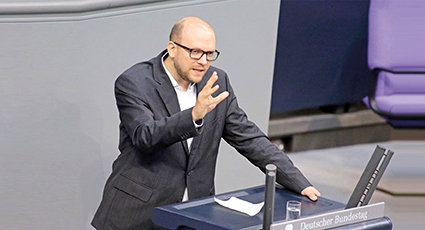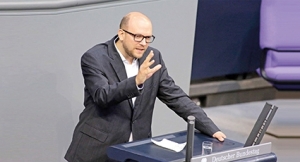Sarrazin: “Chancellor Merkel was Honest about Georgia’s NATO Future”
Exclusive Interview
To say that German Chancellor Angela Merkel’s South Caucasus trip was picked apart in media and social networks would be a gross understatement – everything, from comparisons between the reception ceremonies of the three countries to the Chancellor’s insights on sensitive Caucasus conflicts was scrutinized and hotly debated. Conspiracy theories abounded to the point that people were asking whether the fact that Merkel did not meet Georgia’s octogenarian Patriarch, but met his Armenian counterpart in Yerevan, carried any hidden message. Yet, Merkel, larger-than-life figure that she is, wasn’t alone on this diplomatic pilgrimage: she was accompanied by members of the German Bundestag from various parties. Among them was Manuel Sarrazin from the German Greens, who recounted to GEORGIA TODAY his impressions of Georgia in an exclusive interview.
What were your personal impressions about Georgia and how much did they differ from the rest of the delegation?
[It is] one of the most beautiful countries not only in the region but probably in all of Europe… the whole delegation was impressed, and we met really nice people, had interesting talks, enjoyed a good atmosphere. The evening was delightful and the Chancellor received a special gift [A 17th century painting that was originally preserved in a museum in Dresden} from the Georgian Prime Minister, which was a great sign of trust and this really, really impressed all the Germans present there.
After Chancellor Merkel visited Azerbaijan, you said that interest in commodity deals [Azerbaijani gas] should not lead to any discounts on human rights. What would you say about the price of Russian gas? Should it lead to a discounting of what Russia has done and is doing in Georgia and Ukraine?
No, of course not. This is why my party is strongly opposed to the building of the Nord Stream-2 pipeline and it is why we say we need to diversify our sources of natural gas. It was an important message to show that it’s not only economic interests in Azerbaijan that brought Germany to the region but also an interest in human rights.
As a specialist in Eastern Europe, how much do you think the dependence on Russian gas influences the German and, in retrospect, European foreign policy?
The general rule is that Russia is more dependent on selling gas to Europe than Europe is dependent on buying gas from Russia. But, of course, there is a political influence on energy interests and this is also present in the government's position and in the party position. It would be dishonest to say that we are completely free of influence, but in any case everyone in German politics, except the right wing and the left wing extremists, wants to be more independent from Russian gas and this is because we see that Russian politics are starting to influence our societies; so let's say the influence is not zero but it's not as big as some might think.
There was a saga regarding the word “occupation.” some journalists got the feeling that Chancellor Merkel was avoiding saying it
It is clear to us Germans that as long as Georgia has occupied territories, with no solution, the country needs support from the European Union and from Germany. This is a critical situation, as Chancellor Merkel told us during the press conference. She is quite clear and outspoken regarding Russian foreign policy in the European neighborhood, so I don't think she would shy away from using the word “occupation,” specifically. When we talked about it afterwards, it was quite clear that she has no problem calling the regions occupied.
She made a statement that she doesn’t see Georgia becoming a NATO member in the near future and cited Abkhazia and South Ossetia as reasons for that. Considering Germany was a country that was divided when it became a NATO member, are we seeing a bit of a political hypocrisy here?
My personal opinion is that the European Neighborhood Policy (ENP) and the Eastern Partnership should have included the perspective of full membership in the European Union, which is actually not the case. My party has a different stance on the finality of the ENP and Eastern Partnership. Yet we both know that the path is long, and Georgia is not on the way to fast track membership of the European Union. We should make Georgian society aware that we have internal policy problems in the EU at the moment. Clear decisions about the Macedonia negotiations are yet to be made, for example, because of other member states’ political situations.
But why not risk granting Georgia the umbrella of collective security that comes with NATO membership?
My party is not so “NATO-loving,” which is why I was trying to lead the discussion to the European Union side of the coin. NATO membership for Georgia hasn’t been agreed since the Bucharest Summit 10 years ago, but of course the political situation in NATO and in the regions of Georgia at the moment is not so easy as to allow the promise of a fast-track membership. I think we should focus on going without MAP as far as possible and on making the situation in Georgia better. NATO for Georgia should not be a taboo, it should be something which is really there. Chancellor Merkel’s statement on Georgia’s NATO future was honest if not that pleasant to hear – but I think it best not to hide these things and not to raise false expectations.
Speaking not as a German politician but as an average German citizen, what would those skeptical about Georgia's euro-Atlantic aspirations have to say about Georgia joining NATO?
The arguments would have nothing to do with Georgia; it would be an argument against NATO or the Russian factor. It is clear in the end that there is no consensus in German politics or society on the fast and easy membership of Georgia into NATO. I think a step-by-step approach is the best thing to move forward: do the homework for MAP, implement reforms, deliver results and success. I'm quite convinced that for the Kremlin administration, economic success for Georgia is the biggest threat. I doubt a military escape from Russia is realistic for the country; making Georgia successful economically is the best next step, together with successful MAP implementation.
But when you have a country which at any given moment can be overrun by a much stronger neighbor, what kind of substantial economic growth can we talk about?
Georgia is showing that it can organize growth. I don't think Georgia is in a situation where aggression from Russia is imminent – crossing the line here wouldn’t be accepted by the proverbial West – NATO, the European Union. The EU showed in Ukraine how far we can limit such situations, even without there being NATO membership. What the German delegation was also showing by visiting the Administrative Boundary Line [in Georgia] was a clear sense of solidarity.
At the 2008 Bucharest Summit, Germany and France were against giving Georgia MAP. Had they had a different position, could the two subsequent wars have been avoided?
Frankly speaking, I don't know. At the time, a lot of Green politicians, including myself, were thinking the EU could be a better answer than NATO for this region. But we all saw what happened in 2013/2014, so now we know this is no longer true. Yet, Germany was also reluctant in Copenhagen 1993 when the promise was made for the countries of Central Europe to become members of the EU. If we want to be honest to our Russian friends, we should be clear on our own interests in Georgia, in Ukraine and in the common neighborhood, so that they know what our strategic ambition is, and I think Europe does have a strategic ambition there. Regarding the NATO membership of Georgia, in Germany, politically, there is no consensus.
It's not very often that you hear from a Green politician those two words: Russian friends, so could you define what kind of Russian friends Germany has?
There's friendship between Germany and Russia which is deep and important, including the relationship between the two peoples. We should not underestimate the changes which will happen in future in Russian society. The recent Levada Center poll showed clearly that the majority of Russians don't want to have a politically isolated country – But of course, I wouldn't call myself a friend of the current government administration: the Kremlin is an opponent to a stable and strong European democracy and Germany.
[Interview edited for clarity]
By Vazha Tavberidze












